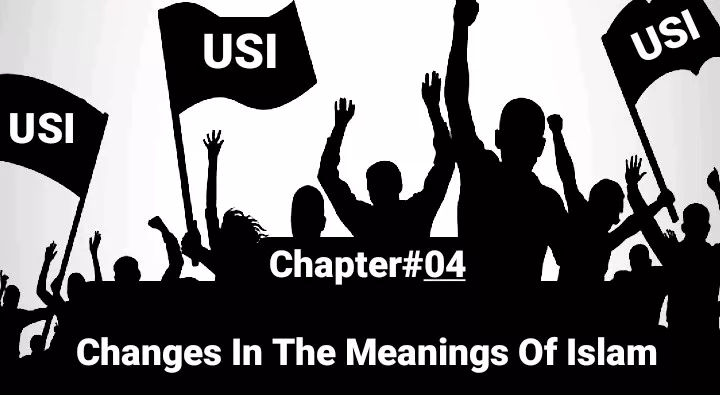USI Chapter#04
Chapter 4
Changes in the Meanings of Islam. Section a
Orthodox Schools of Thoughts. Section b
Rationalist Movements. Section – a
ORTHODOXISM
Due to the Muthazilites, who preferred reason to the revelation, Orthodox Schools of thoughts, which included Safities, Jabarites, Zahirites, the Mujassamites (Anthropomorphist), the Muhadathin (Traditionalists) who all tried to preserve the original religion of Islam from the foreign effects, i.e. especially from Greek philosophy. Muthazilites were influenced by Greek philosophy and they tried to explain everything with reasons. The Orthodox Schools of thoughts became strongly reactive to the teachings of Muthazilites and held strictly to the literal meaning of Quran. As, the Orthodox held their opinion in reaction to the rationalists, i.e. Muthazilites, therefore, they went to the other extreme as not to use reasons but professed the blind following or Taqleed. Some of the important teachings of the Orthodox Schools of thought are as following. The Orthodox groups, particularly the Zahirites, the Mujassamites (Anthropomorphist), the Muhadathin (Tradistionalists), and the Jurists, all of which were wholly opposed to the use of reason or Kalam in defending or explaining religious dogmas and condemned any discussion about them as innovation. The Zahirites became inclined to blind faith and blind following Taqleed. They objected use of reason, as innovation. Whereas, Asharites, a rational group, gave the answer, the Prophet (Peace Be upon Him) had not stopped from the use of reasons, therefore, abolishing the use of reasons, is an innovation. The Prophet (Peace Be upon Him) was not unaware of these matters and philosophical problems and knew them in detail, as these problems did not arise during his lifetime; there was no question of his discussing or not discussing them. The companions of the Prophet (Peace Be upon Him) discussed and argued about many religious matters, which appeared during their lifetime, although there was no direct and explicit injunction about them, and because of the absence of any explicit injunction from the Prophet (Peace Be upon Him), they differ in their judgments about them. Asharites did not oppose the use of reasons; on the other hand, Asharites considered rationalization of faith is necessary in Islam. On the other hand, Orthodox were the extremists, and their extreme views which were held by the Orthodox Schools of thoughts, maintained that Allah possesses all the attributes mentioned in the Quran and all such attributes as Allah having hands, legs, ears, eyes and He is sitting firmly “istova” on His throne, must be taken in literal sense. Such a view of the attributes of Allah is pure Anthropomorphism, implying Allah’s bodily existence whereas, Muthazilites were of the view that Allah is One, Eternal, Unique, and Absolute Being, Having no touch of dualism in Him. His...
Changes in the Meanings of Islam. Section a
Orthodox Schools of Thoughts. Section b
Rationalist Movements. Section – a
ORTHODOXISM
Due to the Muthazilites, who preferred reason to the revelation, Orthodox Schools of thoughts, which included Safities, Jabarites, Zahirites, the Mujassamites (Anthropomorphist), the Muhadathin (Traditionalists) who all tried to preserve the original religion of Islam from the foreign effects, i.e. especially from Greek philosophy. Muthazilites were influenced by Greek philosophy and they tried to explain everything with reasons. The Orthodox Schools of thoughts became strongly reactive to the teachings of Muthazilites and held strictly to the literal meaning of Quran. As, the Orthodox held their opinion in reaction to the rationalists, i.e. Muthazilites, therefore, they went to the other extreme as not to use reasons but professed the blind following or Taqleed. Some of the important teachings of the Orthodox Schools of thought are as following. The Orthodox groups, particularly the Zahirites, the Mujassamites (Anthropomorphist), the Muhadathin (Tradistionalists), and the Jurists, all of which were wholly opposed to the use of reason or Kalam in defending or explaining religious dogmas and condemned any discussion about them as innovation. The Zahirites became inclined to blind faith and blind following Taqleed. They objected use of reason, as innovation. Whereas, Asharites, a rational group, gave the answer, the Prophet (Peace Be upon Him) had not stopped from the use of reasons, therefore, abolishing the use of reasons, is an innovation. The Prophet (Peace Be upon Him) was not unaware of these matters and philosophical problems and knew them in detail, as these problems did not arise during his lifetime; there was no question of his discussing or not discussing them. The companions of the Prophet (Peace Be upon Him) discussed and argued about many religious matters, which appeared during their lifetime, although there was no direct and explicit injunction about them, and because of the absence of any explicit injunction from the Prophet (Peace Be upon Him), they differ in their judgments about them. Asharites did not oppose the use of reasons; on the other hand, Asharites considered rationalization of faith is necessary in Islam. On the other hand, Orthodox were the extremists, and their extreme views which were held by the Orthodox Schools of thoughts, maintained that Allah possesses all the attributes mentioned in the Quran and all such attributes as Allah having hands, legs, ears, eyes and He is sitting firmly “istova” on His throne, must be taken in literal sense. Such a view of the attributes of Allah is pure Anthropomorphism, implying Allah’s bodily existence whereas, Muthazilites were of the view that Allah is One, Eternal, Unique, and Absolute Being, Having no touch of dualism in Him. His...




